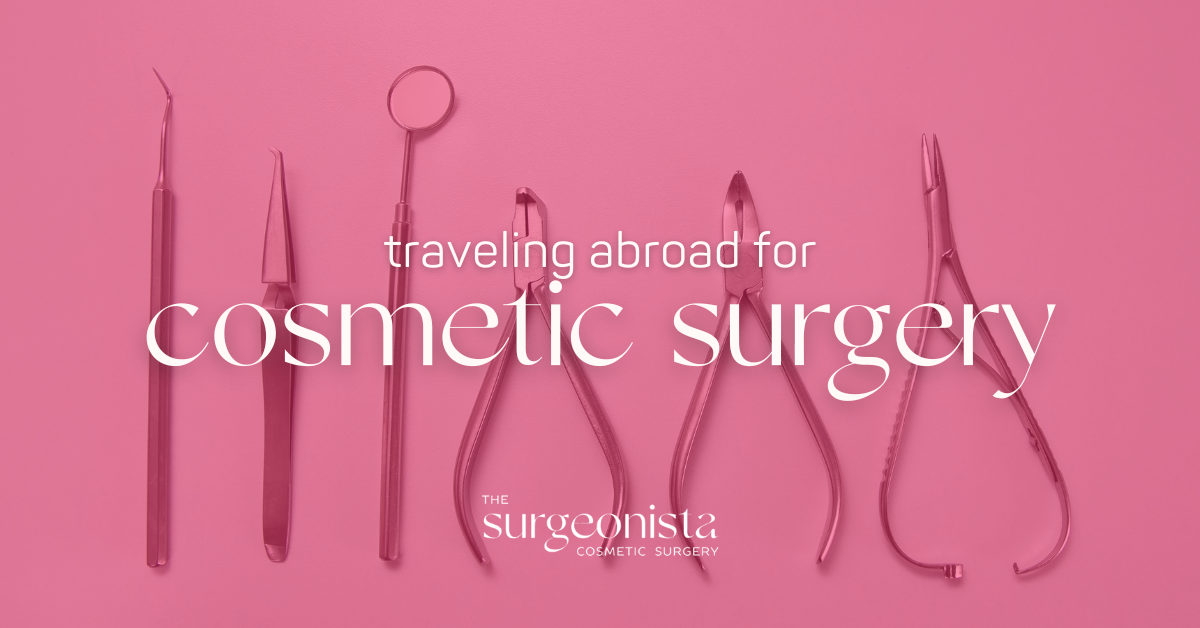By Dr. Gina Maccarone, MD, FACS, FAACS

Medical tourism, the practice of traveling to another country (or even out of state) for medical care, has become increasingly popular in recent years, especially when it comes to elective procedures like cosmetic surgery. On the surface, it might sound appealing: lower costs, exotic destinations, and all-inclusive surgery packages. But when it comes to your health, your body, and the long-term outcome of your procedure, the truth is a little more complicated.
In my practice, I’ve had many patients ask about going abroad for cosmetic surgery, and just as many come to me for help when something goes wrong after having surgery elsewhere. So let’s talk honestly about what’s really involved, what risks you need to know, and how to make choices that prioritize your safety and your results. If you’re considering traveling for cosmetic surgery, this is the real talk I want you to read first.
Let’s start with why so many people are drawn to medical tourism in the first place. Most often, it comes down to cost. Procedures like breast augmentation, tummy tucks, or liposuction can be significantly cheaper in other countries, especially when bundled with hotel stays and recovery care in an all-inclusive package. It can sound like a dream: surgery and a tropical vacation at a fraction of the price. But cosmetic surgery isn’t just a one-and-done event. It’s a medical procedure that carries real risks, requires thoughtful planning, and demands safe, comprehensive follow-up care.
One of the biggest concerns I have is the lack of continuity in care. I’ve seen patients who were discharged from a facility just hours after surgery, sent back to their hotel with minimal instructions, and told to fly home within days. Others never even spoke with their surgeon until the morning of the procedure. This lack of personal connection and planning is a red flag, and it can lead to complications, confusion, and, unfortunately, revisional surgery down the line.
You might be surprised to learn that even domestic destinations like Miami have become hot spots for high-volume, low-cost cosmetic surgery centers. These “surgery factories” often book dozens of patients per day and may skip critical safety steps in the name of efficiency. It’s not just about saving money. It’s about what gets sacrificed in the process. Comprehensive consultations, careful medical evaluations, and thorough aftercare often fall by the wayside.
The truth is, real surgery requires real planning. That includes meeting with your surgeon in advance, reviewing your health history, understanding the risks, and having a recovery plan in place that includes access to medical help if complications arise. Long flights after surgery can increase the risk of blood clots, and certain vacation activities, like swimming, sunbathing, or even walking tours, can delay healing and increase the chance of infection.
I also want to emphasize how important it is to be informed. Cosmetic tourism isn’t inherently bad, and there are talented, well-trained surgeons all over the world. But verifying their qualifications isn’t always easy. Outside the U.S., there may be no way to confirm if your surgeon is board-certified or if the facility is accredited. The products used, like implants or injectables, might not meet FDA standards. And if something goes wrong, legal recourse may be limited or nonexistent.
Even if you have a smooth surgery abroad, complications can show up days or weeks later, when you’re already back home and far from the original surgeon. Revision procedures are often more complex than the first surgery, and they can end up costing more than if the procedure had been done by a qualified cosmetic surgeon in the U.S. from the start.
This is why I always encourage patients to approach surgery with the same care and diligence they would for any other major health decision. In my practice, I work closely with patients from the first consultation through every stage of recovery. I believe in personalized care, transparent conversations, and building long-term trust. If you’re considering cosmetic surgery, make sure you’re working with a board-certified surgeon who prioritizes safety, offers continuity of care, and is available to you not just on surgery day, but every day after, too.
Cosmetic surgery can be transformative, empowering, and deeply personal, but only when it’s done safely and with your future in mind. So before you book that flight, ask the hard questions, do your homework, and know that the best results come from the best care. You deserve nothing less.
Xo,
Dr. G.
